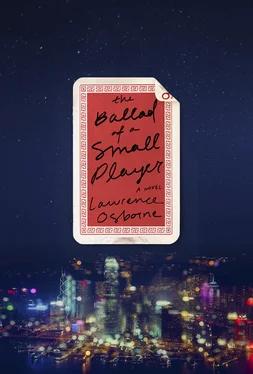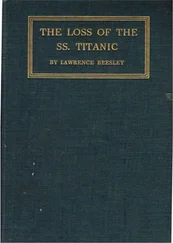We walked across the island until Mount Shenhouse came into view and then the other little port of Sok Kwo Wan. The sweat dripped off her fingers and I could see the drops darken the ground. She was still closed in some way, shuttered away.
I thought to myself that it must have been because of the way we met. One doesn’t forget such things. It was the money that had passed between us during those first hours. Money had brought us together and it had driven the wedge between us. And yet it had also brought us together again. It was always between us, like air that has not been disturbed for centuries. It poisoned us and brought us back to life; it held us apart even as it glued us at the hips. She could smell money on me, and I could smell it on her. Money, too, made us both pariahs. That was why the patrons of the lobster restaurant could not quite look us in the eye. We were outcast dogs and we had a dusty smell of kwai upon us. It was a smell like decomposition, I imagine. She was well aware of this, and I was sure it made her sadly unable to open herself to me, however much she had described the place of her childhood. She would be opening herself to more ruin, I thought, more rape at the hands of money, and that couldn’t be risked. She had risked herself once and she would not do it a second time. No one ever does, not willingly. So I was content to take her hand while we were eating slipper lobsters and let her be. I knew that she would never give anything more than compassion, because compassion was now the emotion she believed in most. She was not the only one.
We sat by the water in Sok Kwo Wan, at the Wai Yee, and she ordered too much food because, she said, she wanted me to eat and get well again. The staff watched her sullenly from behind the tanks where the lobsters played with their antennae and the Japanese clams sulked.
“They hate me,” she said to me under her breath. “Look at them. So pompous. So judgmental.”
“They seem afraid of you.”
“I wish they were. Hypocrites.”
We ate with our fingers, scouring out the little shells of the lobsters and sectioning the humphead wrasse.
“You miss the tables already,” she said coolly. “I wanted you to stay here. For a little while longer, anyway. But I can sense you want to get back to your tables. I won’t stop you if you do.”
“It’s not that.”
“I can feel you thinking about them.”
“I’m very grateful for everything,” I said. “You’ve saved me. I don’t know what else to add—”
“But you’re bored.”
“No.”
“You’re bored and you have to go back to your games.”
“Well,” I burst out, “that’s one way of putting it. Even a small player has his loves and dreams!”
Her hand tensed and almost withdrew.
“But then how will you raise the money?”
There was nothing to say to this, except, “One of the boys will come through for me. I can beg.”
“Will you beg?”
“I’ll do anything. I have no shame.”
She bit her lip for a moment, as if about to laugh.
She asked me if I would drink rice wine. Why not?
“Better to steal than beg,” she said, snapping her fingers at the lurking waiters.
“I’ve always begged — it works.”
“I’ve always stolen. It works, too.”
We drank the rice wine a little greedily.
“I’m a virtuoso beggar,” I laughed.
“You can steal from me if you want. But you can’t beg from me — I won’t give you anything.”
The boats had stopped moving across to Hong Kong; the sea was too rough and the piers reserved for the Rainbow restaurant had emptied out as the late-nighters decamped for the “Lamma Hilton.” I noticed that she didn’t get drunk; glass after glass and the effect upon her was unnoticeable. She didn’t say anything irrelevant. Her mind was perfectly focused. I began to wonder about this composure, this marvelous concentration, her hands laid on the white tablecloth like needles pointing toward invisible things. I noticed the scarf she wore around her neck. It was hiding something. We walked back to the house, a long, blowsy tramp along that roller-coaster path.
“It’s strange,” I said, “how this storm stops and starts. It was so fine during the day—”
“There’s no moon either.”
I put my arm around her, and the thin hip flinched.
In Ko Long we smoked a pipe on the bed and made love. It was slow, glacial in some way, and she was far off in her mind. I kissed the swelling around her neck, which encircled it entirely. She didn’t catch my intrusion quickly enough and she shuddered, as if discovered.
We talked through the night.
“You can’t go back to that life,” she said. “Stay with me. You don’t need money here.”
For how long? I thought.
“You’re a gentle man. You’ve taken the wrong path.”
“It could be.”
“I can see you as you are.”
“But I am as I am,” I said. “I’m what they call a night-walker.”
“Oh, I don’t judge you. I know very well what you are. Just as you know very well what I am. We can’t do anything about it.”
I thought, I don’t want to do anything about it .
I couldn’t change, I admitted. It’d be a waste of time to even try. In the realm of the hungry ghosts, no effort is rewarded.
She nodded at this, and her eyes lowered.
“It’s always too late to change.”
Tears welled into my eyes, and thank God it was dark and she wasn’t curious about them because I would have had no explanation. Sometimes one can feel that one has suddenly lost something that one never had in the first place. It just slips out of the hand and breaks.
On the balcony behind us metal chimes sang in the dark, and the lights of the house near us came on. I could hear everything on the mountainside. She made no sound. She held my wrists and bent over me with her neck arched to one side, but not in avoidance. The intensity inside her was not expressive. It seemed to me — I was trying to see it — that it was coiled into a definite shape, like the metal rings of a spring compressed upon one another and forming a sort of tunnel. It expanded and contracted with small gasps and tensions of the legs, and I didn’t know what it was or why she made love in this way, which was without fluidity or affection or drama. It was as if everything around her was invisible and had no weight. I thought then that it had to be because we didn’t know each other at all, that we had merely been thrown together by chance, and this collision in the dark had its own meaning but it was not a clear one. She leaned back and her hair flew around her for a second, a great fan of scented and varnished fibers. She had the look of a dervish stopping in midspin, her eyes locked. She cried out and a second later there was no trace of that sound whatsoever.
When I woke, she was gone. Though the rain had stopped, the trees by the windows continued to drip like little taps, the eaves as well, and oily puddles had formed on the sills. I looked over at the kitchen and saw a lockbox sitting next to the microwave. She must have had thousands and thousands of dollars in there, and in the end all I needed was enough for the ferry and three hands at the Hong Fak. I could hike down the road to the jetty and take a direct boat to Macau. It was possible. I could take a bit of money and send it back to her. I wouldn’t send it back, of course. Money once taken is sucked down into the maw and never spat back up again. I said it to myself in one nice Cantonese phrase: hou yan wu chi . Dead to shame. I was dead in that sense and it no longer made any difference to me if I went from begging to stealing, it was all the same. It was a question of which one was more effective. There was no one to beg from. Still, I hesitated. Ancient scruples baked in the oven of Western civ.
Читать дальше












